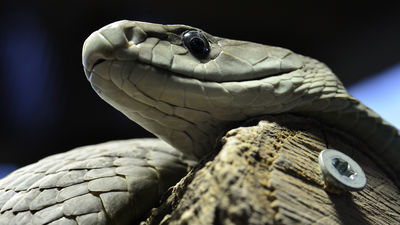The world's first non-human primat to receive a new corona vaccine for orangutans and bonobos

While humans are being vaccinated with the new coronavirus vaccine in each country, the San Diego Zoo in the United States has been the first non-human primate to receive the new coronavirus vaccine for three orangutans and five bonobos. It was.
First great apes at US zoo receive COVID-19 vaccine made for animals
https://www.nationalgeographic.com/animals/article/first-great-apes-at-us-zoo-receive-coronavirus-vaccine-made-for-animals
Great apes at San Diego Zoo become first non-humans to receive COVID-19 vaccine --CBS News
https://www.cbsnews.com/news/great-apes-san-diego-zoo-receive-covid-19-vaccine/
At the San Diego Zoo, gorillas were infected with the new coronavirus (SARS-CoV-2) in January 2021, and several animals showed symptoms of the new coronavirus infection (COVID-19). Among them, a 49-year-old 'Winston' who organizes a gorilla herd seems to have developed severe arrhythmia and pneumonia, but he said that he recovered by treatment with a monoclonal antibody. At the time of writing the article, it seems that all the gorillas who developed COVID-19 have recovered.
Gorilla infected with new coronavirus-GIGAZINE

It is known worldwide that animals such as dogs , cats , tabby cats, and minks are infected with SARS-CoV-2, but large apes with DNA relatively close to humans are particularly susceptible to SARS-CoV-2. That is. Due to the small population of large apes such as gorillas, orangutans, and bonobos, there are concerns that COVID-19 may endanger a valuable population.
Nadine Lumberski, director of conservation and wildlife health care at the San Diego Zoo Wildlife Alliance, said she initially had no idea of vaccination of zoo-reared apes. However, he explained that he decided to administer the vaccine after seeing the gorillas actually develop COVID-19.
Lumbersky contacted Zoetis, a manufacturer of veterinary drugs and vaccines, when zoo gorillas developed COVID-19. Zoetis has developed a new coronavirus vaccine for dogs and cats by October 2020, and was already confident that it would be safe and effective for dogs and cats.
Although the new animal coronavirus vaccine has only been tested in dogs and cats, Lumbersky decided that it was 'worth the risk' and procured the new animal coronavirus vaccine from Zoetis. In February 2021, four orangutans and five bonobos were vaccinated while they were distracted by a snack. These nine animals were the first non-human primates to be vaccinated with the new coronavirus vaccine.

According to Lumbersky, the vaccinated individuals have not seen any side effects and will be in the process of collecting blood to check for antibody production. There are some large apes in the zoo that have not been vaccinated yet, but they will be vaccinated soon. The new coronavirus vaccine given to orangutans and bonobos this time used synthetic peplomer instead of the actual virus to immunize against the virus.
At the time of the decision to administer the new coronavirus vaccine to orangutans, it was unclear whether the vaccine would work for apes, and there was no certainty that no harmful immune response would occur. But Lumbersky said, 'We don't randomly get the vaccine and give it to new species. What are the risks of vaccination, what are the risks of not giving it?' Thoughts and research are taking place. Our most important motto is to do no harm. '
In zoos, it is not uncommon to administer vaccines made for other animal species to other animals. Vaccines designed for dogs and cats may be given to lions and tigers, and influenza and measles vaccines made for humans may be given to apes.
Other than the San Diego Zoo, American zoos are also planning to vaccinate apes, according to a Zoetis spokeswoman. Zoetis expects to be able to provide more vaccinations for animals by June 2021.

Related Posts:






